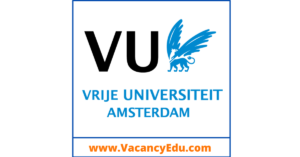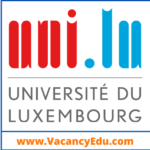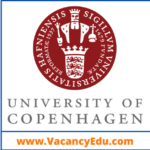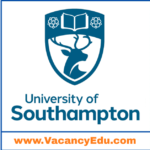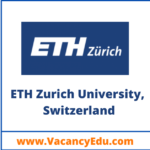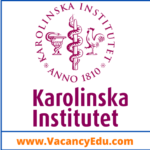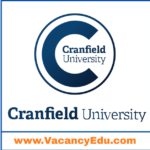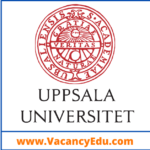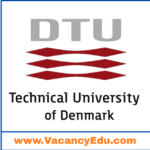Vrije University Amsterdam, Netherlands invites online Application for number of Fully Funded PhD Degree at various Departments. We are providing a list of Fully Funded PhD Programs available at Vrije University Amsterdam, Netherlands.
Eligible candidate may Apply as soon as possible.
(01) PhD Degree – Fully Funded
PhD position summary/title: PhD position in microbial ecology and health during the first 1000 days of life
Deadline :15-5-2025
(02) PhD Degree – Fully Funded
PhD position summary/title: PHD Stress in Action
As a PhD student your main mission is to help the Stress in Action community research and implement the most effective tools for the continuous, reliable and daily life recording of the physiological stress response. You will begin by contributing to data collection and reporting in the Stress in Action validation pipeline at VU where we assess the reliability, validity, and usability of both research-grade and consumer wearables in natural settings. These include smartwatches, rings, skin patches, stretch-band electrodes, and sensor-infused clothing. With the most promising tools selected for stress assessment in daily life you will then coordinate an extensive study that uses this toolkit in the Netherlands Twin Register. Monozygotic and dizygotic twins will be monitored in daily life for a period of six months using wearables, passive sensing and Ecological Momentary assessment. In the first two days we also employ the VU-AMS that measures the heart period time series, blood pressure, the pre-ejection period, electrodermal activity, and peak-valley based respiratory sinus arrhythmia as measures of sympathetic and parasympathetic activity. Your thesis will be grounded in the rich, high-resolution datasets generated through the validation pipeline and this ambitious cohort study. You’ll focus on ambulatory psychophysiology, exploring which features are most predictive of stress-protective lifestyles (e.g. exercise), coping and personality styles, and polygenetic risk for stress-related cardiometabolic and mental health outcomes.
Deadline :18-5-2025
View All Fully Funded PhD Positions Click Here
(03) PhD Degree – Fully Funded
PhD position summary/title: PhD on improving human-robot collaboration (HRC) using brain-computer interfaces
You will work closely with Dr. Maryam Alimardani from the Department of Computer Science, Vrije Universiteit Amsterdam and Dr. Herke van Hoof from Amsterdam Machine Learning Lab (AMLab), University of Amsterdam on the topic of neuroadaptive human-robot collaboration.
The project is focused on improving human-robot collaboration (HRC) using human brain signals as implicit feedback for robot learning. Specifically, we aim to employ EEG-based brain-computer interfaces (BCI) to extract brain responses associated with human perception of robot’s errors during a collaborative task. The extracted EEG response will then be employed in a Reinforcement Learning (RL) framework to optimize robot learning and behavior.
This project is part of the larger Hybrid Intelligence (HI) project with the goal to create responsible intelligent systems that work together with humans as teams while adapting to their strength and needs.
Deadline : 16-5-2025
(04) PhD Degree – Fully Funded
PhD position summary/title: PhD The Organization of Innovation for Sustainability Transition
This PhD position is part of an interdisciplinary team of three PhD researchers, one postdoc, and two senior researchers in the project ‘EXTRA’: From EXperiment to sustainable change: TRAnsformative methodologies for innovation and learning. EXTRA is a collaboration between multiple universities and public and private partners to research and advance physical and experimental environments as enabling methodologies for learning and innovation, also known as living labs.
Living labs are applied by various change-makers, including governmental actors, industry partners, NGOs, researchers, and citizens, to co-create innovations. However, while much experimentation and innovation occur, achieving long-term systemic change remains difficult. Therefore, the main purpose of EXTRA is to amplify the transformative power of living labs with novel insights, instruments, and human capacities, thus enabling change-makers to make sustainable changes and societal impacts.
In the consortium this PhD research will focus on the organization of innovation to accelerate sustainability transition. More specifically, by gathering knowledge and analyses across different fields and cases, this research will identify and validate (inter)organizational approaches, interventions, and business models to overcome barriers and enable the public-private collaboration needed for embedding, translating, and scaling innovations.
Deadline :28-4-2025
(05) PhD Degree – Fully Funded
PhD position summary/title: PhD student in Machine Learning
We are looking for a new PhD student who will do research in the area of machine learning (ML) and in particular on reinforcement learning (RL) and the application of these techniques in a large health project (CAREPATH). The EU funded CAREPATH project focuses on improving medication adherence and persistence for patients with chronic conditions across six European countries. The position is embedded in the Quantitative Data Analytics (QDA) group of the VU in close collaboration with the Amsterdam University Medical Center and companies developing the interventions tools. The QDA group focuses on both fundamental and application-driven research in ML while the Amsterdam University Medical Center has a wealth of experience in applying complexity science to health intervention development. We are looking for candidates with experience in the area of machine learning, with a special preference for those having expertise in one or more of the following areas: reinforcement learning, the utilization of domain knowledge in ML, and data efficient ML methods. We are interested in attracting a PhD student that is able to perform ground-breaking research in fundamental aspects of machine learning and reinforcement learning, with a willingness to deploy the models in real-life applications.. The goal within the project is to apply the developed algorithms in an app and use them to personalize medication adherence interventions.
Deadline : 30-4-2025
Polite Follow-Up Email to Professor : When and How You should Write
Click here to know “How to write a Postdoc Job Application or Email”
(06) PhD Degree – Fully Funded
PhD position summary/title: PhD position on Risk Preferences
You will conduct independent, high-quality research and work together with a diverse team of researchers, that is supported by high-level industry experts. The project that you will be part of aims at improving our understanding of the foundation of risk preferences. The analysis may include experiments, theory, and financial applications (general equilibrium and life-cycle models). The setup of the project allows you to show and develop a variety of skills and write a very complete job market paper, such that you will be very competitive on the academic job market. On the other hand, the strong ties of the project with the industry experts, also give you the opportunity to prepare well for an industry position.
The exact details of your schedule are determined in close consultation between you, and your supervisors. It is possible to work remotely but travelling to Amsterdam for meetings and teaching activities is required. This PhD position is a full-time position for a period of three years. The school provides opportunities to attend conferences, go on an exchange, meet other international researchers, and participate in various training modules that support your knowledge and skills development.
Deadline : 31-5-2025
(07) PhD Degree – Fully Funded
PhD position summary/title: PhD position Psychophysiological underpinnings of Exercise Motivation
Sports enthusiasts of varying skills and expertise batter city streets or explore nature on their regular exercise rounds. Recreational social exercise initiatives such as Park Run are slowly conquering the world, with more than 10 million registered participants across the globe. However, at the same time we see that the number of active people, defined as those who are member of a sports club, is dropping with age. Research from RIVM has shown that where 42% of the Dutch population of 10-25 year olds participate in club sports, this number declines to 16-22% of those at ages above 25 yrs old, in The Netherlands. Continued engagement in sport throughout the lifespan is thus not a given, also not for those who previously engaged actively in sport.
Knowing that a physically active lifestyle has been linked to health and longevity, the Netherlands has set the ambition to become the sportiest nation by 2030. To obtain this goal, we will need to better understand the challenges and motivations of recreational exercisers: What drives people to become active and remain active, and what feeds their exercise motivation? In this project, we will take a psychophysiological approach exploring the underpinnings of exercise motivation in sport and exercise. In previous work, we have studied the interplay between fatigue, affective load, social factors and situational factors in competitive situations, which gained us a better understanding of competition. How do these interacting internal and external mechanisms now play a role in exercise motivation, for example what is the role of social factors or affective load? We aim to further use virtual reality settings to impose elegant experimental manipulations developing our understanding of the underpinnings of exercise motivation. In this project, you will thus contribute to developing an underpinning framework to understand exercise motivation as a multidimensional construct. You will explore potential applications to promote sport and exercise motivation and thereby exercise participation in the general population, to contribute to a healthy society for all and work towards real life impact.
Deadline : 9-5-2025
(08) PhD Degree – Fully Funded
PhD position summary/title: PhD positions in applied probability and network optimization
The Department of Mathematics of Vrije Universiteit Amsterdam welcomes applications for two fully-funded, 4-year PhD positions in applied probability and network optimization for climate-aware energy systems.
Both positions are part of a NWO research project motivated by one of the biggest challenges of our time: keeping the lights on in a world of clean energy and climate extremes. As we move away from fossil fuels and embrace renewables like wind and solar, our power grids must adapt to the rising threat of extreme weather events. This joint research project brings together advanced math, applied probability, and network science to build smarter and more resilient energy systems. By modeling how climate-driven disasters ripple through energy networks and by optimizing how we design and operate them, the goal is to create a new generation of tools that help prevent cascading failure and blackouts —even in the face of storms, heatwaves, and the unpredictable future of our climate.
Deadline : 25-5-2025
Click here to know “How to Write an Effective Cover Letter”
(09) PhD Degree – Fully Funded
PhD position summary/title: PhD Position on Neuro-symbolic AI in Hybrid Intelligence
A fully funded four-year Ph.D. position is available at the Vrije Universiteit Amsterdam on developing neuro-symbolic intelligent systems in the context of the Hybrid Intelligence Centre (https://www.hybrid-intelligence-centre.nl).
Hybrid Intelligence systems – where humans and AI collaborate to achieve shared goals – must satisfy properties such as explainability, safety, efficient adaptability, and effective collaboration. Neuro-symbolic systems are a promising way to realise these properties, since humans use symbolic language (concepts in natural language, graphs) to communicate while machine learning systems use subsymbolic components to operate.
Deadline : 15-5-2025
(10) PhD Degree – Fully Funded
PhD position summary/title: PhD Position: Software Architecture for Human-Centric AI Systems
Do you want to contribute and collaborate to shape the future of human-centric computing models and applications with an eye on society? Then keep reading, this fully funded PhD position at Vrije Universiteit (VU) Amsterdam may be for you!
Human-centric AI aims to steer the development and application of AI towards personal and social good while minimizing harm. It builds on the capabilities of generative AI and foundation model techniques and enhances their ability to be collaborative, adaptive, responsible, and explainable (abbreviated as CARE principles). Human-centric AI can enable effective human-AI teaming, leading to hybrid systems that yield more than the sum of their parts. However, as an emerging discipline, human-centric AI and its principles have resulted in a wide range of proposed systems, leading to a poorly understood landscape of requirements, benefits, and limitations. It remains challenging to design effective human-centric AI systems, i.e., systems that reliably achieve the CARE principles without substantially harming other important quality attributes (QAs) like maintainability or energy consumption. As a solution, the synthesis and curation of software architecture techniques like design decisions, architectural tactics, patterns, or reference architectures can enable practitioners to design human-centric systems, while supporting the reasoning about trade-offs between various quality attributes, e.g., explainability, maintainability, or energy consumption.
The Learning and Reasoning and the Software and Sustainability groups are looking for a joint PhD student in software architecture for human-centric AI. The project will survey the emerging landscape of systems in human-centric AI, investigate how to systematically organize them into modular building blocks, and from there into reusable software architecture techniques. The project will investigate how the various design decisions influence the CARE principles, as well as other QAs like maintainability, evolvability, or performance efficiency. Taking a system perspective that is shaped by quality attribute trade-offs, the PhD student will synthesize and evaluate software architecture design techniques to support practitioners building such systems. To bridge the gap between these two fields, the PhD student will be supported by one supervisor with extensive human-centric AI expertise (Dr. Filip Ilievski) and one supervisor with extensive software architecture expertise (Dr. Justus Bogner).
Deadline : 5-5-2025
Connect with Us for Latest Job updates
(11) PhD Degree – Fully Funded
PhD position summary/title: PhD Candidate: Generating Generosity
The PhD candidate is part of the project “Generating Generosity”, investigating why individuals with more income and wealth in the Netherlands tend to give less as a proportion of wealth and wealth, and how generosity may be enhanced.
The project includes theoretical, methodological, empirical and societal-intervention components. From a theoretical perspective, the project derives an overview of plausible explanations of the negative income/wealth-generosity gradient. The methodological component entails the development of a weighting procedure to link survey responses to income and inheritance tax register data. After deriving a solid theoretical input and a reliable weighing procedure, the project team will analyse linked survey-register data to empirically study theoretical considerations on the negative income/wealth-generosity gradient. Finally, the project includes field experiments to find ways to reverse this gradient and enhance generosity in society. The research will be conducted in collaboration with a group of stakeholders in fundraising and wealth management, and with the office of national statistics (Statistics Netherlands, CBS). More information about the project is available at https://renebekkers.wordpress.com/2024/07/23/generating-generosity/. The full proposal, including a detailed description of the subprojects, is available at https://osf.io/e3mux/.
The project team consists of a PhD candidate (that could be you!), a postdoctoral researcher, and a research assistant, is guided by Rene Bekkers, and works with an advisory board consisting of Mark Ottoni-Wilhelm, Sarah Smith and Hans Schmeets. The team members will all be hired for this project. For the postdoc position, we are seeking a highly motivated and talented researcher, with a keen eye for strong research designs. The successful candidate is an expert in longitudinal analysis of survey and/or register data, and has conducted behavioral experiments, preferably in the field.
Deadline : 6-5-2025
Polite Follow-Up Email to Professor : When and How You should Write
(12) PhD Degree – Fully Funded
PhD position summary/title: PhD position in collective dynamics on networks
The Department of Mathematics of Vrije Universiteit Amsterdam welcomes applications for a fully-funded, 4-year PhD position in collective dynamics on networks within the Amsterdam Center for Dynamics and Computation. We are an inclusive, interdisciplinary group, and diversity and internationalism is at the heart of our research principles, as well as our teaching practice.
As a PhD student in our group, you will develop new mathematical methods to understand and predict collective motion in active oscillator networks, with the aim of finding new control strategies and design principles for active and intelligent materials. You will collaborate with Christian Bick (VU), Bob Rink (VU), Corentin Coulais (UvA), Marjolein Dijkstra (UU) and Krystal Guo (UvA).
This project is part of the consortium Emergence at all Scales (EAAS) funded by the Dutch science foundation NWO. If selected for this position, you are expected to participate in the various scientific activities, meetings and workshops of the EAAS consortium, to form interdisciplinary collaborations across fields and geographical locations within the Netherlands, and to acquire skills by active participation in science communication activities, interacting with public audiences and taking part in a pilot program where experience can be acquired in high school science teaching.
Deadline : 5-5-2025
(13) PhD Degree – Fully Funded
PhD position summary/title: PhD-student in molecular and cellular neuroscience
Synaptic plasticity, the ability to modify synaptic strength in response to activity, is a fundamental process underlying learning and memory. Traditionally, the study of synaptic plasticity has primarily been focused on the molecular events in neurons that induce long-term alterations in synaptic structure and function. However, it is becoming increasingly clear that astrocytes, the most common glial cell type in the brain, play a key role in the regulation of synaptic transmission and plasticity. Astrocytes can have numerous small protrusions that contact synapses. These fine perisynaptic astrocyte processes (PAPs) closely interact with synapses that allow precise regulation of synapse structure and function. Currently however, we lack a complete molecular understanding of the mechanisms through which astrocyte-synapse interactions modulate synaptic transmission and plasticity.
In this project, you will investigate the molecular processes that control the formation and activity-induced remodeling of astrocyte-synapse interactions. You will use CRISPR/Cas9-based labelling and perturbation techniques combined with advanced (super-resolution) microscopy techniques to study astrocyte-synapse interactions in different model systems (organotypic hippocampal slice cultures and hippocampal tissue sections).
This project is part of the interdisciplinary SUPERGLUE consortium, bringing together several groups from the VU Amsterdam and Amsterdam UMC to investigate how subcellular compartments of the astrocyte control cognitive processing. You will exploit a variety of techniques and analysis tools available. Core methodology, cell models, equipment, analysis software and viral vectors are available from the start of the project. You will be trained on-site and in specialized courses on campus.
Deadline : 30-4-2025
(14) PhD Degree – Fully Funded
PhD position summary/title: 3 PhDs, Digital Twins, Operational Analytics, and Reconfigurable Computing
Massive virtual worlds are online environments where users share joint experiences for entertainment, education, and commerce. The most popular examples of online worlds are multiplayer games like Minecraft and Fortnite, with player-modifiable worlds enabling rich interaction. Next-gen virtual worlds have tighter performance requirements as they are accessed from Virtual Reality headsets and support modifiable virtual environments (MVEs). Performance problems can directly cause the user to be nauseous. We expect next-gen virtual worlds that take advantage of the compute continuum from the user’s device to a large datacenter.
Experimentation across the compute continuum with diverse devices, large datacenters, large-scale networks, and deep software stacks is expensive and complex. Digital twins solve this problem by replicating the real-world infrastructure in software and responding to changes the same way the original infrastructure would. This enables users to ask counterfactual questions ranging from simple, “What is the performance impact of new hardware?”, to complex, “How will the new AI software stack change my profit margin?”
In this project, the candidate will design and implement software to run massive virtual worlds (10,000+ users) on the Kubernetes platform. The candidate will build a digital twin of the virtual worlds and Kubernetes using, for instance, the in-house data center simulator developed by our group the OpenDC simulator (https://opendc.org/). The user will use this toolkit composed of the digital twin and real-world software to run experiments that would be impossible using just the real-world software or the digital twin.
Deadline : 30-4-2025
About The Vrije University Amsterdam, Netherlands –Official Website
The Vrije Universiteit Amsterdam is a public research university in Amsterdam, Netherlands, founded in 1880, and consistently ranks among the top 150 universities in the world by major ranking tables. The VU is one of two large, publicly funded research universities in the city, the other being the University of Amsterdam (UvA). The literal translation of the Dutch name Vrije Universiteit is “Free University”. “Free” refers to independence of the university from both the State and the Dutch Reformed Church. Both within and outside the university, the institution is commonly referred to as “the VU”. Although founded as a private institution, the VU has received government funding on a parity basis with public universities since 1970. The university is located on a compact urban campus in the southern Buitenveldert neighbourhood of Amsterdam and adjacent to the modern Zuidas business district.
In 2014, the VU had 23,656 registered students, most of whom were full-time students. That year, the university had 2,263 faculty members and researchers, and 1,410 administrative, clerical and technical employees, based on FTE units. The university’s annual endowment for 2014 was circa €480 million. About three quarters of this endowment is government funding; the remainder is made up of tuition fees, research grants, and private funding.
The official university seal is entitled The Virgin in the Garden. Personally chosen by Abraham Kuyper, the Reformed-Protestant leader and founder of the university, it depicts a virgin living in freedom in a garden while pointing towards God, referring to the Protestant Reformation in the Netherlands in the 16th and 17th century. In 1990, the university adopted the mythical griffin as its common emblem.
Disclaimer: We try to ensure that the information we post on VacancyEdu.com is accurate. However, despite our best efforts, some of the content may contain errors. You can trust us, but please conduct your own checks too.
Related Posts
- PhD Degree (20) -Fully Funded at Luxembourg, Luxembourg

- PhD Degree (23) -Fully Funded at University of Copenhagen, Denmark

- PhD Degree (31) -Fully Funded at University of Southampton, England

- PhD Degree (24 )-Fully Funded at ETH Zurich, Switzerland

- PhD Degree (13)-Fully Funded at Karolinska Institute, Sweden

- PhD Degree (11) -Fully Funded at Cranfield University, England

- PhD Degree (34) -Fully Funded at Newcastle University, England

- PhD Degree (19) -Fully Funded at Uppsala University, Sweden

- 25 PhD Degree-Fully Funded at Technical University of Denmark (DTU), Denmark


